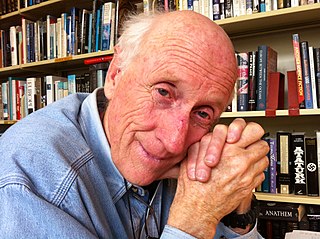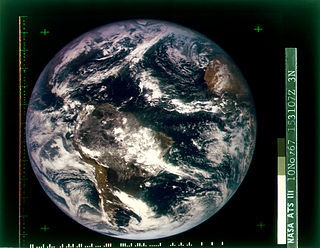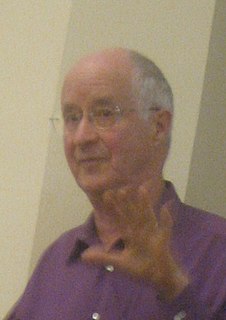
Ernest Callenbach was an American author, film critic, editor, and simple living adherent. He became famous due to his internationally successful semi-utopian novel Ecotopia (1975).
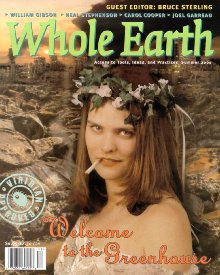
Whole Earth Review was a magazine which was founded in January 1985 after the merger of the Whole Earth Software Review and the CoEvolution Quarterly. All of these periodicals are descendants of Stewart Brand's Whole Earth Catalog.
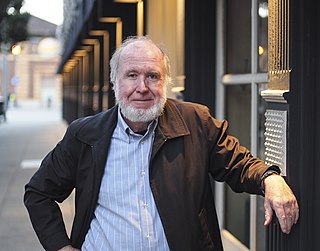
Kevin Kelly is the founding executive editor of Wired magazine, and a former editor/publisher of the Whole Earth Review. He has also been a writer, photographer, conservationist, and student of Asian and digital culture.
Out of Control: The New Biology of Machines, Social Systems, and the Economic World (ISBN 978-0201483406) is a 1994 book by Kevin Kelly. Major themes in Out of Control are cybernetics, emergence, self-organization, complex systems, negentropy and chaos theory and it can be seen as a work of techno-utopianism.

CoEvolution Quarterly (1974–1985) was a journal descended from Stewart Brand's Whole Earth Catalog. Stewart Brand founded the CoEvolution Quarterly in 1974 using proceeds from the Whole Earth Catalog. It evolved out of the original Supplement to the Whole Earth Catalog. Fred Turner notes that in 1985, Brand merged CoEvolution Quarterly with The Whole Earth Software Review to create the Whole Earth Review.

The Whole Earth 'Lectronic Link, normally shortened to The WELL, is one of the oldest virtual communities in continuous operation. As of June 2012, it had 2,693 members. It is best known for its Internet forums, but also provides email, shell accounts, and web pages. The discussion and topics on The WELL range from deeply serious to trivial, depending on the nature and interests of the participants.
Fred Turner is Chair of the Department of Communication at Stanford University and the author of three books:
"The Californian Ideology" is a 1995 essay by English media theorists Richard Barbrook and Andy Cameron of the University of Westminster. Barbrook describes it as a "critique of dotcom neoliberalism". In the essay, Barbrook and Cameron argue that the rise of networking technologies in Silicon Valley in the 1990s was linked to American neoliberalism and a paradoxical hybridization of beliefs from the political left and right in the form of hopeful technological determinism.
The Portola Institute was a "nonprofit educational foundation" founded in Menlo Park, California in 1966 by Dick Raymond. The Portola institute helped to develop other organizations such as The Briarpatch Society. It was also the publisher of Stewart Brand's Whole Earth Catalog beginning with the first issue in 1968. The first issue of The Whole Earth Catalog notes that the catalog is one division of The Portola Institute and that other activities of the Institute include: "computer education for all grade levels, simulation games for classroom use, new approaches to music education, Ortega Park Teachers Laboratory." Raymond and Brand later collaborated to form the Point Foundation.
The Whole Earth Software Catalog and The Whole Earth Software Review (1984–1985) were two publications produced by Stewart Brand's Point Foundation as an extension of The Whole Earth Catalog.

The Hackers Conference is an annual invitation-only gathering of designers, engineers and programmers to discuss the latest developments and innovations in the computer industry. On a daily basis, many hackers only interact virtually, and therefore rarely have face-to-face contact. The conference is a time for hackers to come together to share ideas.

Picospan was a popular computer conferencing tool written by Marcus D. Watts for the Altos 68000. It was written in 1983, for the most famous and popular computer conferencing system at that time, called M-Net, which was owned and operated by Mike Myers. Sometime in 1984, Marcus's employer, an Ann Arbor company called Network Technologies International (NETI) purchased the rights for PicoSpan planning to develop it into a commercial product called E-Forum.
Global Business Network (GBN) was a leading consulting firm that specialized in helping organizations to adapt and grow in an increasingly uncertain and volatile world. Using tools and expertise in scenario planning, experiential learning, together with networks of experts and visionaries, GBN advised businesses, NGOs, and governments in addressing their most critical challenges, helping them to gain the insight, confidence and capabilities they needed to shape their future. GBN was previously a member of Monitor Group, prior to the acquisition of Monitor by Deloitte. GBN was based in San Francisco, and had offices in New York City, London, and Cambridge, Massachusetts.
Cyber-utopianism – the belief that online communication is in itself emancipatory, and that the Internet favors the oppressed rather than the oppressor – has accompanied the Internet from its beginnings; and was the subject of critique by the Critical Art Ensemble as early as 1995. While the romantic view of cyberspace was partially dented by the bursting of the dot-com bubble, utopian views of the internet continued to re-invent themselves through the Noughties.
James Fadiman is an American psychologist and writer. He is acknowledged for his extensive work in the field of psychedelic research. He co-founded along with Robert Frager the Institute of Transpersonal Psychology, which later became Sofia University, where he was a lecturer in psychedelic studies.
The Electronic Information Exchange System was an early online conferencing bulletin board system that allowed real-time and asynchronous communication. The system was used to deliver courses, conduct conferencing sessions, and facilitate research. Funded by the National Science Foundation and developed from 1974-1978 at the New Jersey Institute of Technology (NJIT) by Murray Turoff based on his earlier EMISARI done at the now-defunct Office of Emergency Preparedness, EIES was intended to facilitate group communications that would allow groups to make decisions based on their collective intelligence rather than the lowest common denominator. Initially conceived as an experiment in computer mediated communication, EIES remained in use for decades because its users "just wouldn't let go" of it, eventually adapting it for legislative, medical and even spiritual uses.

